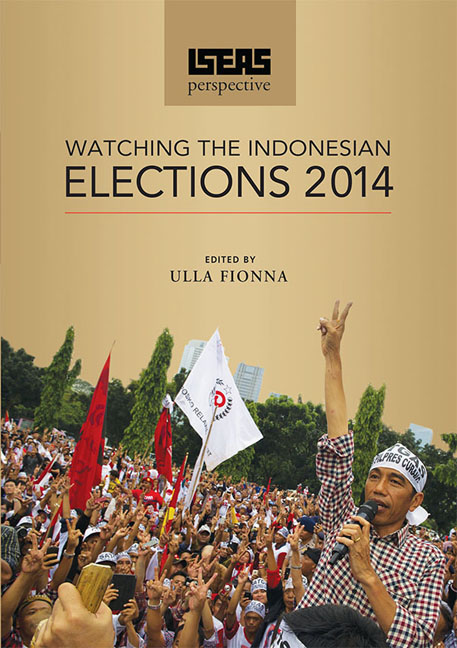Book contents
- Frontmatter
- Contents
- Foreword
- Introduction
- 1 The Gubernatorial Race in Jakarta: Background and Implications
- 2 Indonesian Parties Struggle for Electability
- 3 Who Will Be Indonesian President in 2014?
- 4 Indonesian Presidential Election Forcing Rejuvenation of Parties
- 5 Resisting Democracy: Front Pembela Islam and Indonesia's 2014 Elections
- 6 Getting to Know the Contestants of the 2014 Indonesian Parliamentary Elections
- 7 A Snapshot of the Campaigning in Indonesia's 2014 Legislative Elections
- 8 Unpacking the Results of the 2014 Indonesian Legislative Elections
- 9 Indonesia's 2014 Legislative Elections: The Dilemmas of “Elektabilitas” Politics
- 10 The Islamic Factor in the 2014 Indonesian Elections
- 11 Vote-buying in Indonesia's 2014 Elections: The Other Side of the Coin
- 12 Gap Narrows Between Candidates in Indonesian Presidential Elections
- 13 Analysing the Economic Platforms in the Indonesian Presidential Election
- 14 Indonesian Islamic Parties After the 2014 Elections: Divided and Self-Centred
- 15 Safeguarding Indonesia's Pluralism: An Essential Task for Joko Widodo
- 16 Jokowi's Key Economic Challenge: Improving Fiscal Policy for Equitable Growth
- 17 Crossing the River While Avoiding the Stones: Jokowi's Run-up to the Presidency
- 18 Post-elections Indonesia: Towards a Crisis of Government?
- Epilogue: Jokowi's First Months: Compromise Cabinet, Subsidy Cuts, and Corrupt Coalition
8 - Unpacking the Results of the 2014 Indonesian Legislative Elections
Published online by Cambridge University Press: 29 July 2017
- Frontmatter
- Contents
- Foreword
- Introduction
- 1 The Gubernatorial Race in Jakarta: Background and Implications
- 2 Indonesian Parties Struggle for Electability
- 3 Who Will Be Indonesian President in 2014?
- 4 Indonesian Presidential Election Forcing Rejuvenation of Parties
- 5 Resisting Democracy: Front Pembela Islam and Indonesia's 2014 Elections
- 6 Getting to Know the Contestants of the 2014 Indonesian Parliamentary Elections
- 7 A Snapshot of the Campaigning in Indonesia's 2014 Legislative Elections
- 8 Unpacking the Results of the 2014 Indonesian Legislative Elections
- 9 Indonesia's 2014 Legislative Elections: The Dilemmas of “Elektabilitas” Politics
- 10 The Islamic Factor in the 2014 Indonesian Elections
- 11 Vote-buying in Indonesia's 2014 Elections: The Other Side of the Coin
- 12 Gap Narrows Between Candidates in Indonesian Presidential Elections
- 13 Analysing the Economic Platforms in the Indonesian Presidential Election
- 14 Indonesian Islamic Parties After the 2014 Elections: Divided and Self-Centred
- 15 Safeguarding Indonesia's Pluralism: An Essential Task for Joko Widodo
- 16 Jokowi's Key Economic Challenge: Improving Fiscal Policy for Equitable Growth
- 17 Crossing the River While Avoiding the Stones: Jokowi's Run-up to the Presidency
- 18 Post-elections Indonesia: Towards a Crisis of Government?
- Epilogue: Jokowi's First Months: Compromise Cabinet, Subsidy Cuts, and Corrupt Coalition
Summary
INTRODUCTION
The recently concluded legislative election in Indonesia produced several unexpected results. The first one was the underperforming results of the opposition party the Indonesian Democratic Party–Struggle (Partai Demokrasi Indonesia–Perjuangan, PDI-P), which failed to capitalize on the popularity of its presidential candidate Joko Widodo (popularly known as Jokowi).
The party is estimated to have won only 19 per cent of the popular vote, far below the expected 25 to 30 per cent that had been predicted by a number of Indonesian public opinion surveys. Another unexpected result of the legislative election was the strong showing of Islamic political parties, which seem to have obtained a combined vote share of nearly 32 per cent. This reverses their poor results in the 2009 legislative elections and defies predictions made by pollsters and journalists that these parties were going to achieve even worse results in this election.
This article unpacks the results of the Indonesian legislative election (pemilihan legislative/pileg) by focusing on these two key findings. Based on a comparison of estimated results from the current election with the final results from previous post-Reformasi elections (1999, 2004, and 2009), it is argued that:
a. Although PDI-P managed to achieve a significant vote gain in this election, it failed to capitalize on the popularity of its presidential candidate, Jokowi, due to the lack of television advertising, local-level campaigning of candidates, possible vote-buying at the grassroots level, and internal rivalries between Jokowi supporters and those of PDI-P chairwoman Megawati Soekarnoputri, and;
b. The stronger-than-expected results of the Islamic parties should not be interpreted as evidence of political Islam gaining ground in Indonesia. Instead, this result can be attributed mostly to the parties’ strategy to re-focus their campaign within their own primary constituencies.
EVALUATING PDI-P's PERFORMANCE
Twelve national political parties competed in the 2014 legislative election, and PDI-P was favoured to win big, especially after it nominated the popular Jakarta Governor Joko Widodo as its presidential candidate on 14 March 2014. Opinion polls had expected the party to ride the wave of the “Jokowi effect” and comfortably pass the 25 per cent popular vote threshold, which would have enabled it to nominate its own presidential candidate without seeking coalition partners.
- Type
- Chapter
- Information
- ISEAS PerspectiveWatching the Indonesian Elections 2014, pp. 62 - 74Publisher: ISEAS–Yusof Ishak InstitutePrint publication year: 2015

